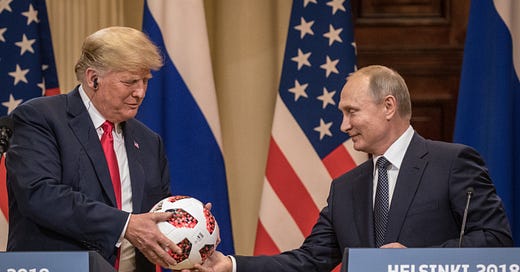Russia Will Try to Interfere in 2020. But Will Putin Even Back Trump?
The president has called the nation's 2016 interference a "hoax" rather than acknowledge such meddling might have aided his victory.
President Trump is the last elected federal office holder who still refuses to acknowledge efforts by the Russian government to interfere with American elections. He may regret that stance after 2020. FBI Director Chris Wray has warned that Russian electoral interference in 2020 will be worse than in 2016. Trump shouldn’t assume he’ll be the beneficiary next time around.
Democrats have made election interference a central issue, and many Republicans, at various points along the Trump-friendliness spectrum, have acknowledged the ongoing threat. Senator Rob Portman said in a statement, “There are new details about the extent to which the Russians worked to undermine our democracy and I hope that the House and Senate review these findings carefully and continue to work together to ensure this type of election interference never, ever happens again.”
Representative Elsie Stefanik promised to “continue to focus on what matters: interference in our elections by Russia and other foreign adversaries.”
Senator Pat Toomey called the Mueller report “a stark reminder that Russia's goal is to undermine the trust the American people have in our democratic process and government." Senator Cory Gardner took an even more aggressive tone: “The report also confirms what we already know, Russia interfered in our election. I will keep up the pressure on the Putin regime and pursue additional sanctions – they cannot go unpunished.” Senator James Lankford also used the “what we already know” formulation in his statement.
Even Senator Lindsey Graham warned that the Russian government was “very involved in the 2016 election, they’re coming at us again and I’d like to stop them.”
By contrast, the president has called Russian election interference “a goddamn hoax.” White House acting Chief of Staff Mick Mulvaney reportedly advised former Secretary of Homeland Security Kirstjen Nielsen not to bring up election interference – even possible future efforts – in front of Trump, saying it “wasn’t a great subject.”
Trump is unwilling to admit the truth for fear of tainting his supposedly overwhelming electoral victory. But next time, he may be on the other side of the tipped scale.
Trump’s supporters and critics alike emphasize a contrast between Trump the man and the Trump administration when on Russia policy. “If you compare objectively, President Trump’s policies to Russia to President Obama’s policies to Russia,” observed Senator Ted Cruz, “by any measure, President Obama was much easier, was much more gentler [sic] on Russia.”
The Republican National Committee has a section of the GOP website devoted cataloguing Trump’s hawkishness toward Moscow.
Tenacious Trump critic Noah Rothman has made the same distinction, noting that Trump’s public obsequiousness to Vladimir Putin doesn’t match American policy since 2017, which has included expanded sanctions against the Russian government and economy, arms sales to Ukraine, expulsion of diplomats, and liquid natural gas exports to Europe that undermine Russian economic leverage.
Trump himself tweeted,

His cup runneth over with his own Kool-Aid.
But if the Trump administration is so hawkish toward Russia, can it reasonably be expected that the Kremlin would put their thumb on the electoral scale for him again in 2020? What if Trump’s aggressive posture encourages the Russians to favor Bernie Sanders, who honeymooned in the Soviet Union in 1988, or Joe Biden, who favored the nuclear freeze, opposed missile defense, and promoted permanent normal trade relations with Russia five years after Russia invaded Georgia?
The Mueller report outlined two distinct efforts by the Russian government and associated individuals and businesses to interfere with American elections. The first was a social media strategy designed to amplify the most divisive and incendiary voices online, exploiting preexisting fissures in American society to get us all to hate one another. (As if we needed their help.) This tactic didn’t favor one party over another.
The other tactic was explicitly partisan. Putin has a long-standing hatred of Hillary Clinton, and not for the reasons basically everyone else does. Just as she was poised to become president, along came Trump: divisiveness personified, and a chance to weaken Clinton. A little hacking of DNC emails was all it took to tilt the scales, possibly decisively.
As easy as it was to hack the DNC and top Democrats (hello, John Podesta), Trump himself presents an even softer target. The only obstacle to Russian hackers repeating their 2016 hacking strategy against Trump would be finding something on his email that could actually embarrass him.
It’s almost as if the president of the United States has an interest in protecting the very system that propelled him to the most powerful office in the world.
But instead of leadership in the face of an unprecedented threat, what’s more likely is yet another politicized national security threat on the heels of another “hacked election” in 2020. As we’ve seen so many times before, everyone will switch sides: Republicans will demonize Russia for attacking America aka Trump, and Democrats will demonize Trump for doing nothing about election interference during his presidency just as Trump does now to Obama.
This is why we can’t have nice things.





